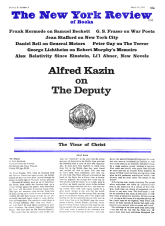In response to:
The Threat of History from the February 20, 1964 issue
To the Editors:
Those of us who have already read Professor Marcuse’s book, One-Dimensional Man, were amazed to find so little pertinent discussion of it in Lichtheim’s lengthy review…. Since your readers may conceivably be interested in the book itself, as distinct from Lichtheim’s personal views on contemporary society, we shall attempt to summarize its general outlines.
(1) The concept of “one-dimensional man” asserts that there are other dimensions of human existence in addition to the present one and that these have been eliminated. It maintains that the spheres of existence formerly considered as private (e.g. sexuality) have now become part of the entire system of social domination of man by man, and it suggests that totalitarianism can be imposed without terror.
(2) Technological rationality, which impoverishes all aspects of contemporary life, has developed the material bases of human freedom, but continues to serve the interests of suppression. There is a logic of domination in technological progress under present conditions: not quantitative accumulation, but a qualitative “leap” is necessary to transform this apparatus of destruction into an apparatus of life.
(3) The analysis proceeds on the basis of “negative” or dialectical thinking, which sees existing things as “other than they are” and as denying the possibilities inherent in themselves. It demands “freedom from the oppressive and ideological power of given facts.”
(4) The book is generally pessimistic about the possibilities for overcoming the increasing domination and unfreedom of technological society; it concentrates on the power of the present establishment to contain and repulse all alternatives to the status quo.
Lichtheim, we suggest, has committed precisely that fault against which Marcuse is protesting: he has endorsed (like the ADA liberals) positive thinking, for instance in his optimism and in his espousal of Cold War ideology. Examples: British society is freer than ever before in “our part of the world” we can rely on “the sanity of the average citizen” (!); democracy will bring about gradual improvement if left to its own devices (Marcuse shows how thought manipulation renders real democracy impossible today); the United States “chiefly needs a Labor party” to develop a viable social and political program (has he ever seen the demands of the AFL-CIO platforms).
Lichtheim’s adherence to the official Cold War ideology is especially pernicious. “The real block to understanding” between West and East “arises quite simply from the intellectual incapacity of the other side”; their ideology is a “debased Populism”; the potentialities of totalitarianism have manifested themselves only in the Communist nations (European fascism was an “unsuccessful experiment”!). Such statements are worthy of USIA propaganda, but not of serious consideration. In ridiculing Communist hopes of surpassing Western production, Lichtheim forgets to mention that only the continued threat of war prevents the collapse of the American economy.
Besides avowing positive thinking, Lichtheim blatantly distorts Professor Marcuse’s position on several occasions. Despite his admiration for Mills, Marcuse does not derive any of his fundamental concepts from Mill’s work nor is his book basically a “Marxist analysis.” And to cite another example, Marcuse quite clearly approves of the higher living standards now enjoyed by the lower classes (see e.g. p. 12).
We suggest that a reviewer who is puzzled by this book’s title and who cannot decide whether the author is a Marxist, a follower of Mills, a Hegelian, or a Freudian (or perhaps all of these) should re-read Marx, Mills, Hegel, Freud or, simply, Marcuse.
Georg H. Fromm
William Leiss
John David Ober
Arno Waserman
Edward J. Wilkins
Weston, Mass.
George Lichtheim replies:
I am not a liberal and never have been. I find liberalism almost as boring as communism and have no wish to be drawn into an argument over which of these two antiquated creeds is less likely to advance us any further. My review of Professor Marcuse’s book proceeded from agreement with its underlying philosophy. I explained at length why I thought it important. I also dissociated myself from its politics, which seemed (and seem) to me unduly pessimistic and excessively influenced by the erratic opinions of the late C. Wright Mills.
Of course Marcuse is a Marxist. That is why he has written an interesting book. His five constituents, who are so anxious to defend him, seem not to have understood him at all. Politics are a different matter. If the five signatories will come out of their stockade for a while and pay a brief visit to Europe, they will discover why the kind of “negative thinking” they fancy makes little appeal here: we are not as helpless as they are, and consequently less frantic. The remainder of their joint manifesto is an exercise in juvenile impertinence.
This Issue
March 19, 1964



